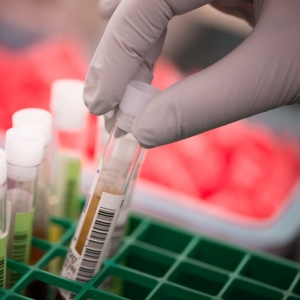The University of Maine at Presque Isle and SAD 1 Adult & Community Education have joined forces to provide a Phlebotomy Certification Program, a first-of-its-kind program for Aroostook County. This collaborative effort prepares students to become certified phlebotomists and opens up a career pathway in the healthcare field leading toward positions as a medical laboratory technician (MLT), medical assistant, or a nurse.
“The MLT Program of Maine is excited to partner with the SAD 1 Adult & Community Education Program to bring phlebotomy training to Aroostook County,” Leigh Belair, UMPI Assistant Professor and Co-Director of the MLT Program of Maine, said. “Locally and nationally, the job outlook for phlebotomists is very promising and this program provides an entry-level opportunity for individuals interested in healthcare and more specifically, the laboratory.”
Belair said becoming a certified phlebotomist provides excellent technical skills in a fairly short training period. As SAD1 Adult & Community Education Program participants, students can complete the Phlebotomy Certification Program on-site at Adult Education, with labs held at UMPI, in 10.5 weeks. Once finished, these students are fully prepared to enter the workforce. In addition, students earn three college credits from UMPI that directly apply to the MLT Program should they choose to continue their lab education.
“Partnering with Adult Education provides a unique experience for students: we can provide the additional support that some non-traditional learners need to be successful in an academic setting. We can help with study skills and time management, provide a quite study space and access to a computer lab, proctor tests and quizzes for students that may need extended time, and provide resources for those that may need accommodations to meet learning needs,” LeRae Kinney, Director of SAD 1 Adult & Community Education, said. “We can also assist with transportation needs if necessary for those that choose to take the national ASCP exam in Bangor after successful completion of the course. We are excited to be a part of this exciting workforce training opportunity in Aroostook County; it is a wonderful partnership.”
The idea for this collaboration took root last year when Belair and Kinney attended a local workforce development meeting. The need for a Phlebotomy program in Aroostook County was discussed, and the two saw a natural partnership opportunity between their respective organizations. Belair provides the curriculum and teaches the class, and she and Kinney partner to select program candidates. The first session was piloted last summer and Belair and Kinney hope to provide another session next fall.
This Phlebotomy Certification Program is designed to meet the American Society of Clinical Pathology (ASCP) certification requirements for a phlebotomy technician. Students must have a high school diploma (or equivalent) and complete a two-part program, consisting of 40 clock hours of classroom training and 100 clock hours of clinical training, with a minimum performance of 100 successful unaided blood collections including venipunctures and skin punctures. ASCP certification demonstrates to employers that an individual is fully competent to perform the professional duties of a phlebotomist. It can also open up job opportunities along with the potential to increase salary.
Belair said that those considering this healthcare career should understand that phlebotomists must adhere to high standards and be committed to quality healthcare delivery, as phlebotomists serve as ambassadors to the laboratory. Major duties of the phlebotomist include: correct patient identification prior to sample collection, collection of the appropriate amount of sample, selection of the appropriate specimen containers for the specified tests, and correct labeling of all specimens with the required patient information.
Empathy, compassion, and confidence are also desired characteristics of a phlebotomist as these are essential to quality patient care, Belair said. Phlebotomists interact with patients throughout each and every day. In addition, patience and reassurance are especially important when helping a nervous patient or child.
“If you’d like to learn more about this exciting healthcare profession, please reach out to us,” Belair said. “We are excited to provide the region with a chance to learn more about laboratory technology through this unique UMPI and Adult Ed collaboration.”
For more information about the program, please contact Belair (207) 768-9440 or at leigh.belair@maine.edu or contact LeRae Kinney at (207) 764-4776 or lerae.kinney@sad1.org.

